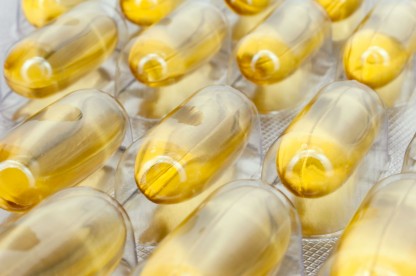The Amazing Link Between Vitamin D and Cancer Survival
 You know vitamin D is good for your bones, your mood, and even your immune system, but what do you know about vitamin D and cancer?
You know vitamin D is good for your bones, your mood, and even your immune system, but what do you know about vitamin D and cancer?
Did you know that vitamin D plays an important role not only in preventing cancer, but also in helping to ensure you survive cancer in the unfortunate event that you’re diagnosed? What’s more, vitamin D even helps to make it more likely that your cancer never comes back.
Blood levels of vitamin D and cancer survival
In a new study of more than 17,000 cancer patients, just published in the Endocrine Society’s Journal of Clinical Endocrinology and Metabolism, researchers again found that having a high vitamin D level when you are diagnosed with cancer means you will be more likely to survive and stay cancer free.[1]
The researchers looked at the results from 25 different studies involving a total of 17,732 patients with cancer to examine how people’s vitamin D levels, as measured by blood levels of 25(OH)D, affect cancer survival. Each of the studies measured vitamin D levels in cancer patients at the time of diagnosis and tracked survival rates.
Cancers with the strongest link
The evidence supporting vitamin D’s protective effect on surviving cancer was strongest for colon (colorectal) cancer, breast cancer, and lymphoma. Overall survival for these cancers was significantly better if patients’ vitamin D levels were in the top 25% of those studied compared to the lowest 25%.
Specifically, those with 25(OH)D levels in the top 25% were:
- 45% more likely to survive colon/rectal cancer
- 37% more likely to survive breast cancer
- 52% more likely to survive lymphoma.
The study also revealed a protective effect from high vitamin D levels on surviving lung cancer, stomach (gastric) cancer, prostate cancer, leukemia, and skin cancer (melanoma). For all cancers combined, the study found that for every 10 nmol/L (4ng/ml) increase in vitamin D levels, cancer survival increased by 4%.
Strongest evidence to date linking vitamin D to cancer survival
“This study could be considered as the most confirmatory evidence to date supporting an association between circulating 25(OH)D levels and cancer outcomes,” said the study’s lead author Hui Wang, MD, PhD, a professor at the Institute for Nutritional Sciences, Chinese Academy of Sciences.[2]
“Considering that vitamin D deficiency is widespread around the world, our suggestion is to ensure everyone has sufficient levels of this important nutrient — that is, circulating 25(OH)D levels — greater than 75 nmol/L [30 ng/mL],” said Dr. Wang.
So what is the optimum vitamin D level in the blood?
No universal consensus exists on the optimal vitamin D intake or the optimal blood levels of 25(OH)D. The Institute of Medicine issued a report in 2011 stating that 25(OH)D concentrations of 50 nmol/L (20ng/ml) are adequate and suggested that these concentrations can be achieved by 600 IU of vitamin D per day.[3] However, many experts, including researchers, conventional MDs, and integrative physicians, disagree, arguing that the optimal vitamin D level in the blood is higher and that the dose of vitamin D needed to achieve optimal levels varies from person to person, but is typically much higher than 600 IUs.[4-6]
Professor Michael Holick, PhD, MD, from Boston University, is considered by many to be the world’s leading vitamin D researcher and authority. Dr. Holick and colleagues recently stated that, according to current scientific knowledge, blood levels of 25(OH)D level should be:
- between 30 and 100 ng/mL (75 to 250 nmol/L) to avoid long-term negative health consequences
- between 40 and 60 ng/mL (100 to 150 nmol/L) for optimal health.[6]
How much vitamin D should you take?
To maintain 25(OH)D levels in the optimal range of 40 to 60 ng/mL, Dr. Holick and fellow researchers explain that vitamin D can be taken daily, weekly, or even once a month, as follows:
- 3,000 IUs daily
- 21,000 IUs weekly
- 90,000 IUs monthly
To treat vitamin D deficiency, which is defined as levels of 25(OH)D below 20 ng/ml, 50,000 IUs of vitamin D once a week or 6,600 IUs daily for 8 to 12 weeks is typically needed.[6] After that, 3,300 IUs daily forever is effective in maintaining a healthy vitamin D status without causing toxicity, say the researchers.[6]
To achieve these levels, supplementation with vitamin D is generally needed, along with consumption of foods containing vitamin D and sunlight exposure (aim for 15 minutes on as much exposed skin as possible, then cover up and use sunscreen).
Associations go far beyond vitamin D and cancer
Were you aware of the link between vitamin D and cancer? What about the links between vitamin D and fatigue, depression, weight gain, or high blood pressure? If you haven’t had your vitamin D level checked lately, or ever, the time is now! Maintaining optimum vitamin D levels is important for cancer prevention and treatment and much, much more. Tell us how you supplement with vitamin D and how it has improved your health in the comments section below.
[1] J Clin Endocrinol Metab. 2014 Apr 29:jc20134320.
[2] Medscape Medical News. 2014 May 1.
[3] J Clin Endocrinol Metab. 2011;96:53-8.
[4] Endocrinol Metab Clin North Am. 2010 Jun;39(2):287-301.


 Ask the EN Experts March 2025
Ask the EN Experts March 2025  Vegan Diet Better Than Omnivore Diet for Cardiovascular Health
Vegan Diet Better Than Omnivore Diet for Cardiovascular Health 